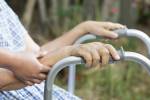Kidney cancer rare but deadly
Dr. Erik Castle says kidney cancer is a lot like weeds in a garden.
Castle, the associate professor of urology at the Mayo Clinic in Arizona, said not treating kidney cancer is a lot like weeds in a garden. If you don't do anything about it, the cancer will spread.
If you remove it, the problem will likely be solved.
"That's what kidney cancer is," Castle said. "It's a cell ... that keeps living and will not die."
While other forms of cancer are incurable, the success rate of living with kidney cancer is very high. Given that, it's imperative to know the signs of kidney cancer to promote early detection and also to know the steps to take after the cancer is discovered.
According to the Kidney Cancer Association, there are about 1.3 million new cancers diagnosed each year in the United States. Last year, just 50,000 of those were kidney cancer.
"One of the nice things, if there is a nice thing, is that essentially kidney in the grand scheme of it all cancers is a rare cancer," Castle said. "You're more likely to be in a car accident."
The medical name for kidney cancer is renal cell carcinoma. There are several forms of kidney cancer. The common types are papillary, sarcomatoid, clear cell and transitional cell.
Usually, a person who thinks they may have kidney cancer will see their general medical doctor. If that doctor thinks they may have kidney cancer, the patient would likely be referred to a urologist, such as Castle.
Early detection is key in treating kidney cancer. The earlier a person is diagnosed with kidney cancer, the greater their rate of survival. One of the reasons is because kidney cancer can quickly spread to other parts of the body. When that happens, surgery isn't as effective as when the cancer stays confined to the kidney.
Another reason why early detection is so important is because kidney cancer does not have the same type of treatments as other cancers.
"There's no chemotherapy that works for them," Castle said. "Kidneys have a way of pumping out kidney therapy."
Radiation therapy doesn't work with kidney cancer, Castle said, because the dosage required would be too high.
"There is an amount of radiation to kill the cells, but it would require such a high dosage," Castle said. "The dosage required to kill those cells would unfortunately be too much for the patient."
Treating kidney cancer has changed drastically over the last quarter-century. Castle said back in 1985, there were very few effective ways to screen for kidney cancer. CT scans were not common, so it was more difficult to pick up on any small mass in the kidney or feel the tumor through the abdomen.
"In patients where the cancer has spread, it has almost universally been fatal in the past," Castle said. "It used to be almost impossible to cure."
But advancements in treatments have made kidney cancer a cancer you can live with.
In the 90s, they started to remove part of the tumor. By the end of that decade, doctors routinely pulled out the entire kidney momentarily to repair the kidney after the tumor was removed.
Nowadays, the ways to surgically remove the cancerous part of the kidney has greatly increased. They can remove some robotically. Other forms of the cancer doctors can now remove with needles that enter through the back and burn or freeze the tumors on the spot.
The treatment proves to be very effective, Castle said.
Removing a stage 1 tumor, or a tumor less than 7 cm, is not very dangerous. After five years, someone who had a stage 1 tumor removed has a 90 to 97 percent chance living.
If the tumor is a stage 2 tumor, or more than 7cm, then that person has about an 85 to 95 percent chance of living after five years, Castle said.
There are many symptoms of kidney cancer that you could look out for. The more symptoms you have, the more likely you are to have kidney cancer. However, even if you have many of the cancer's symptoms, it doesn't mean you have kidney cancer. Only a trip to the doctor will etch that in stone. Symptoms include an abdominal mass, bloody urine, pain in the back, sudden weight loss, fever, and low anemia blood counts.
There are no concrete causes of kidney cancer. However, some genetic factors are believed to play a role. One hereditary disorder called von Hippel Lindau disease has been identified as increasing the risk of kidney cancer. There are also external factors that come into play when determining if a person is at risk for kidney cancer. Smoking increases the risk for kidney cancer, like it does for many other forms of cancer. Being male also might work against you. According to the American Cancer Society, males are more at risk of kidney cancer than women. Men are about twice as likely to develop kidney cancer than women.
Aside from going over symptoms and medical history with a doctor, there are very effective tests that can conclude whether or not you may have kidney cancer. A Computer Tomography scan, or CT scan, is the common test to detect the presence of kidney cancer. A CT scan can help doctors see your internal organs and identify if there is anything wrong with them. A person with kidney cancer would likely have a mass or tumor on the kidney. Because a CT scan essentially takes X-rays from different angles and levels, it can produce a more realistic 3d-like outlook on an organ. With this, doctors can more accurately see any potential tumors or masses on the kidney or other internal organs. MRIs, bone scans and ultrasounds can also help detect cancerous growths on the kidneys.
The many detection methods are pivotal in the fight against kidney cancer. Afterall, it is a rare cancer. So the plethora of detection techniques, couple with the success of removing the cancer surgically, suggest a bright future for people diagnosed with kidney cancer.
"Kidney cancer is a surgical disease - that's a good thing," Castle said. "The cure-rate is high if you catch it in time."























